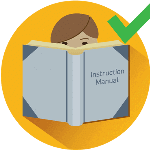 A dissertation culminates years of rigorous research, critical thinking, and dedication to a specific academic field. It represents the pinnacle of one's academic journey and is considered a rite of passage for scholars and students pursuing advanced degrees. However, the path to completing a dissertation is not without its challenges, one of the most crucial being the process of addressing a supervisor's remarks and feedback. Supervisors play an indispensable role in guiding students through the labyrinth of academic research and writing. They serve as mentors, advisors, and gatekeepers to academic excellence. They must provide constructive criticism, valuable insights, and expert guidance to help students refine their dissertations into scholarly masterpieces. Yet, the journey from initial draft to final submission can be arduous, with numerous rounds of revisions and edits required to meet the exacting standards of academia. This is where we come in, to offer reliable dissertation administrator’s opinions addressing help. It encapsulates the essential support and assistance that students often require when navigating the intricate process of responding to supervisor feedback. Addressing these remarks is not just about making superficial changes; it is about engaging in scholarly dialogue, defending one's research choices, and ultimately, improving the quality of the dissertation. At times, the feedback received from supervisors can be overwhelming, leaving students unsure of how to proceed. It is here that our expert guidance becomes indispensable. Professionals well-versed in academia, research methodologies, and the nuances of dissertation writing can provide much-needed clarity and direction to students. They can help decipher the feedback, prioritize revisions, and formulate cohesive responses that not only address the remarks but also enhance the overall quality of the dissertation. We will help you explore the challenges that students face in this endeavor and shed light on how seeking professional comments addressing assistance can be a game-changer in the journey towards dissertation success. So, if you find yourself grappling with your supervisor's remarks, rest assured that there is expert support available to guide you toward academic excellence.
A dissertation culminates years of rigorous research, critical thinking, and dedication to a specific academic field. It represents the pinnacle of one's academic journey and is considered a rite of passage for scholars and students pursuing advanced degrees. However, the path to completing a dissertation is not without its challenges, one of the most crucial being the process of addressing a supervisor's remarks and feedback. Supervisors play an indispensable role in guiding students through the labyrinth of academic research and writing. They serve as mentors, advisors, and gatekeepers to academic excellence. They must provide constructive criticism, valuable insights, and expert guidance to help students refine their dissertations into scholarly masterpieces. Yet, the journey from initial draft to final submission can be arduous, with numerous rounds of revisions and edits required to meet the exacting standards of academia. This is where we come in, to offer reliable dissertation administrator’s opinions addressing help. It encapsulates the essential support and assistance that students often require when navigating the intricate process of responding to supervisor feedback. Addressing these remarks is not just about making superficial changes; it is about engaging in scholarly dialogue, defending one's research choices, and ultimately, improving the quality of the dissertation. At times, the feedback received from supervisors can be overwhelming, leaving students unsure of how to proceed. It is here that our expert guidance becomes indispensable. Professionals well-versed in academia, research methodologies, and the nuances of dissertation writing can provide much-needed clarity and direction to students. They can help decipher the feedback, prioritize revisions, and formulate cohesive responses that not only address the remarks but also enhance the overall quality of the dissertation. We will help you explore the challenges that students face in this endeavor and shed light on how seeking professional comments addressing assistance can be a game-changer in the journey towards dissertation success. So, if you find yourself grappling with your supervisor's remarks, rest assured that there is expert support available to guide you toward academic excellence.
We can Help You Respond to Dissertation Feedback from Supervisors
Responding to dissertation feedback from supervisors is a critical phase in the academic journey, where precision and diligence are paramount. Supervisors play a pivotal role in shaping the quality and rigor of your research, and their feedback is invaluable for refining your work. However, addressing their comments can be a challenging and time-consuming process. "We can help you respond to dissertation feedback from supervisors" is a reassuring statement that encapsulates a valuable resource available to students. This assistance can be a game-changer in the pursuit of academic excellence. We offer help in responding to dissertation feedback and possess a deep understanding of academic standards, research methodologies, and the expectations of supervisors. Their expertise allows them to interpret the feedback accurately and suggest precise revisions. Feedback from supervisors can sometimes be cryptic or open to interpretation. Our expert guidance can provide the clarity you need to understand the specific areas that require attention and improvement in your dissertation. Also, responding to feedback can be a time-consuming process, and students often juggle multiple responsibilities. Seeking our assistance ensures that you can efficiently address the remarks without compromising the quality of your responses. Our professionals can not only help you address the comments but also guide you in enhancing the overall quality and coherence of your dissertation. Their insights can lead to a more polished and academically robust final work. Dissertation writing can be a stressful endeavor, especially when faced with extensive feedback. Having access to our expert support can boost your confidence, knowing that you have the guidance needed to navigate this crucial phase successfully. Ultimately, the goal of responding to supervisor feedback is to improve your dissertation's chances of approval. With our expert assistance, you can increase the likelihood of your work meeting the high standards set by your institution.
We Can Help you Overcome Challenges in Addressing Your Supervisor's Remarks
Addressing the supervisor's remarks on a dissertation is a critical aspect of the academic journey, and it can be a challenging and sometimes overwhelming task. Every scholar aspires to produce a dissertation that meets the high standards set by their institution and demonstrates their expertise in a particular field of study. However, it is not uncommon for students to face various challenges when it comes to responding effectively to their supervisor's feedback. We can help with addressing the supervisor’s remarks on a dissertation, to ensure that you overcome challenges to:
- Understanding and Interpretation: Supervisor feedback may sometimes be complex or unclear. We can help you interpret their comments accurately, ensuring that you address the specific issues they've identified.
- Time Constraints: Many students are juggling multiple responsibilities, including coursework, jobs, and personal commitments. Responding to feedback can be time-consuming. Our professional support can help you manage your time efficiently, ensuring that you meet your deadlines without compromising quality.
- Overcoming Writer's Block: Writer's block is a common hurdle when implementing revisions. Our assistance can provide strategies and insights to help you overcome writer's block and make progress.
- Quality Enhancement: The goal is not just to address remarks but to enhance the overall quality of your dissertation. Our professionals can help you identify areas where improvements can be made, resulting in a more polished and scholarly work.
- Confidence Building: Responding to feedback can be a stressful process. Having access to our expert help can boost your confidence, knowing that you have the support and guidance needed to tackle the challenges effectively.
 In the pursuit of academic excellence, the dissertation serves as a pivotal milestone for scholars across the globe. However, the journey towards creating a flawless dissertation is often marked by rigorous reviews and feedback from supervisors. This crucial phase, while challenging, is instrumental in refining the work and ensuring its academic rigor. At times, these remarks can be overwhelming, leaving students in need of guidance and support. This is where the invaluable assistance of experts in the field becomes indispensable. Addressing a supervisor's remarks on a dissertation is a multifaceted endeavor that necessitates a strategic and systematic approach. Our team of seasoned professionals understands the intricacies of this process and is dedicated to providing comprehensive guidance. We recognize that the feedback provided by supervisors is not a mere critique but a roadmap toward academic excellence. Our experts possess a profound understanding of the academic standards and expectations within various disciplines, enabling them to navigate through the remarks effectively. One of the key aspects of our assistance is the meticulous review of your supervisor's comments. We analyze each remark with precision, ensuring a clear understanding of their expectations and areas of concern. Our team then collaborates with you to develop a customized plan of action, focusing on the specific areas that require improvement. Whether it involves refining research methodologies, enhancing the clarity of your arguments, or strengthening the overall structure of your dissertation, our experts are well-equipped to offer tailored solutions. Furthermore, our assistance extends beyond mere corrections; we empower you with the knowledge and skills necessary to address similar issues in the future independently. We believe in nurturing academic growth, and our commitment to your success drives us to go the extra mile in providing detailed explanations and guidance. The process of addressing supervisor's remarks on a dissertation can be arduous, but it is a critical step toward academic achievement. Our team is dedicated to providing reliable comments addressing help for a dissertation, offering a guiding hand to navigate through this challenging phase. We view each remark as an opportunity for improvement and growth, and our expertise ensures that you emerge from this experience not only with an enhanced dissertation but also with the confidence and skills to excel in your academic journey. With our support, you can turn your supervisor's feedback into a springboard towards a brighter academic future. We can offer reliable help with addressing supervisor's remarks on a dissertation, transforming this daunting process into a constructive and transformative experience.
In the pursuit of academic excellence, the dissertation serves as a pivotal milestone for scholars across the globe. However, the journey towards creating a flawless dissertation is often marked by rigorous reviews and feedback from supervisors. This crucial phase, while challenging, is instrumental in refining the work and ensuring its academic rigor. At times, these remarks can be overwhelming, leaving students in need of guidance and support. This is where the invaluable assistance of experts in the field becomes indispensable. Addressing a supervisor's remarks on a dissertation is a multifaceted endeavor that necessitates a strategic and systematic approach. Our team of seasoned professionals understands the intricacies of this process and is dedicated to providing comprehensive guidance. We recognize that the feedback provided by supervisors is not a mere critique but a roadmap toward academic excellence. Our experts possess a profound understanding of the academic standards and expectations within various disciplines, enabling them to navigate through the remarks effectively. One of the key aspects of our assistance is the meticulous review of your supervisor's comments. We analyze each remark with precision, ensuring a clear understanding of their expectations and areas of concern. Our team then collaborates with you to develop a customized plan of action, focusing on the specific areas that require improvement. Whether it involves refining research methodologies, enhancing the clarity of your arguments, or strengthening the overall structure of your dissertation, our experts are well-equipped to offer tailored solutions. Furthermore, our assistance extends beyond mere corrections; we empower you with the knowledge and skills necessary to address similar issues in the future independently. We believe in nurturing academic growth, and our commitment to your success drives us to go the extra mile in providing detailed explanations and guidance. The process of addressing supervisor's remarks on a dissertation can be arduous, but it is a critical step toward academic achievement. Our team is dedicated to providing reliable comments addressing help for a dissertation, offering a guiding hand to navigate through this challenging phase. We view each remark as an opportunity for improvement and growth, and our expertise ensures that you emerge from this experience not only with an enhanced dissertation but also with the confidence and skills to excel in your academic journey. With our support, you can turn your supervisor's feedback into a springboard towards a brighter academic future. We can offer reliable help with addressing supervisor's remarks on a dissertation, transforming this daunting process into a constructive and transformative experience.
Supervisor Comments on a Dissertation; Supervisor’s Observations
 The process of completing a dissertation is a rigorous and intellectually challenging journey for students pursuing advanced degrees. Throughout this academic endeavor, one of the most crucial phases is the interaction between the student and their supervisor. These interactions, encompassing relevant supervisor comments on the dissertation and the observations, play an integral role in shaping the outcome of the research. In this introduction, we will delve into the significance of supervisor feedback and observations, highlighting their pivotal role in refining the dissertation, guiding the research process, and ensuring academic excellence. Dissertation administrator comments serve as a fundamental aspect of the student-supervisor relationship. These comments are a product of the supervisor's expertise, experience, and commitment to fostering scholarly growth. They offer constructive criticism, insights, and suggestions that challenge students to critically assess their work, refine their research methodologies, and strengthen their arguments. Supervisor comments are not just mere annotations on a paper; they are invaluable opportunities for students to engage in a dialogue that leads to a deeper understanding of their subject matter and research methodologies. Moreover, supervisor observations are equally essential. These observations extend beyond the written comments and encompass the supervisor's holistic assessment of the student's research progress. They include insights into the student's work ethic, time management skills, and overall research approach. Through observations, supervisors can identify potential areas of improvement and provide timely guidance to ensure that the dissertation stays on track. Supervisor comments and observations are a dynamic partnership in the development of a successful dissertation. They facilitate a continuous feedback loop that allows students to refine their research and academic abilities. This process is not merely about meeting academic requirements; it is about nurturing the intellectual growth of aspiring scholars, guiding them towards the highest standards of academic rigor. In the subsequent sections of this discussion, we will explore the various facets of supervisor comments and observations in more detail. We will examine how these elements contribute to the refinement of a dissertation and the overall academic development of the student. Additionally, we will offer insights into how students can effectively navigate and respond to supervisor comments, fostering a productive and mutually beneficial relationship with their academic mentors.
The process of completing a dissertation is a rigorous and intellectually challenging journey for students pursuing advanced degrees. Throughout this academic endeavor, one of the most crucial phases is the interaction between the student and their supervisor. These interactions, encompassing relevant supervisor comments on the dissertation and the observations, play an integral role in shaping the outcome of the research. In this introduction, we will delve into the significance of supervisor feedback and observations, highlighting their pivotal role in refining the dissertation, guiding the research process, and ensuring academic excellence. Dissertation administrator comments serve as a fundamental aspect of the student-supervisor relationship. These comments are a product of the supervisor's expertise, experience, and commitment to fostering scholarly growth. They offer constructive criticism, insights, and suggestions that challenge students to critically assess their work, refine their research methodologies, and strengthen their arguments. Supervisor comments are not just mere annotations on a paper; they are invaluable opportunities for students to engage in a dialogue that leads to a deeper understanding of their subject matter and research methodologies. Moreover, supervisor observations are equally essential. These observations extend beyond the written comments and encompass the supervisor's holistic assessment of the student's research progress. They include insights into the student's work ethic, time management skills, and overall research approach. Through observations, supervisors can identify potential areas of improvement and provide timely guidance to ensure that the dissertation stays on track. Supervisor comments and observations are a dynamic partnership in the development of a successful dissertation. They facilitate a continuous feedback loop that allows students to refine their research and academic abilities. This process is not merely about meeting academic requirements; it is about nurturing the intellectual growth of aspiring scholars, guiding them towards the highest standards of academic rigor. In the subsequent sections of this discussion, we will explore the various facets of supervisor comments and observations in more detail. We will examine how these elements contribute to the refinement of a dissertation and the overall academic development of the student. Additionally, we will offer insights into how students can effectively navigate and respond to supervisor comments, fostering a productive and mutually beneficial relationship with their academic mentors.
Benefits of receiving supervisor opinions in your dissertation journey
Receiving supervisor opinions during your dissertation journey offers numerous benefits that can significantly enhance the quality and success of your research. Receiving supervisor’s remarks on a dissertation is beneficial in guaranteeing;
- Expert Guidance: Supervisors typically possess extensive knowledge and experience in their field of study. Their insights can help you refine your research question, methodology, and overall approach, ensuring that your dissertation is well-informed and academically rigorous.
- Direction and Focus: They can help you narrow down your research focus and objectives. Their guidance can prevent you from veering off track or getting lost in the vast sea of information, ensuring that your work remains relevant and purposeful.
- Quality Control: Supervisors provide valuable feedback on your work, helping you identify and rectify any weaknesses or errors in your research. This constructive criticism ensures that your dissertation maintains high standards of quality and academic integrity.
- Time Management: They can assist you in setting realistic timelines and milestones for your dissertation project. This helps you stay on track and manage your time effectively, reducing stress and preventing procrastination.
- Resources and Networking: Supervisors can connect you with valuable resources, such as access to databases, libraries, or experts in your field. They can also introduce you to academic networks and communities that can further support your research.
- Encouragement and Motivation: Having a supervisor who believes in your research and supports your academic growth can boost your motivation and confidence. Their encouragement can help you overcome challenges and persevere through the ups and downs of the dissertation process.
- Accountability: Regular meetings with your supervisor create a sense of accountability. Knowing that you need to report progress can help you stay committed to your dissertation goals and prevent procrastination.
- Problem-Solving: If you encounter research obstacles or roadblocks, your supervisor can offer guidance and potential solutions based on their experience. They can help you navigate challenges and find innovative approaches to your research problems.
- Professional Development: Working closely with a supervisor allows you to develop valuable research and communication skills. You learn how to present your ideas effectively, engage in scholarly discourse, and defend your research decisions.
Supervisor comments and their influence on dissertation defense success
Supervisor comments on a dissertation play a fundamental role in determining the success of a dissertation defense. Supervisor’s observations influence the outcome in terms of:
- Preparation: Supervisor comments serve as a roadmap for refining and improving your dissertation. By addressing their feedback, you enhance the overall quality of your work, making you better prepared to defend your research. Their guidance ensures that you have thoroughly explored your topic and addressed any weaknesses or gaps.
- Clarity and Coherence: Supervisors help you refine the clarity and coherence of your dissertation. Their feedback ensures that your argument flows logically, your research questions are well-defined, and your findings are presented cohesively. Clarity and coherence are essential for effective communication during your defense.
- Anticipating Questions: They pose questions or critiques that resemble those you may encounter during your defense. By addressing their comments, you gain practice in anticipating and responding to challenging inquiries, enhancing your ability to defend your research effectively.
- Confidence Building: Receiving constructive feedback from your supervisor can boost your confidence in your research. Knowing that your work has been thoroughly vetted and approved by an expert in the field can help you approach your defense with greater self-assurance.
- Revisions and Corrections: By incorporating your supervisor's suggestions, you demonstrate your commitment to improving your dissertation. This proactive approach can impress the defense committee, showcasing your dedication to producing high-quality research.
- Alignment with Academic Standards: They ensure that your dissertation aligns with academic standards and conventions. This alignment is crucial for meeting the expectations of your defense committee, as they will be assessing your work against these standards.
- Mentorship and Support: Beyond feedback, supervisors provide mentorship and support throughout the dissertation process. This mentorship can include guidance on presentation skills, defense strategies, and navigating the defense committee's expectations.
- Endorsement: A supervisor's endorsement carries weight during your defense. Their positive evaluation of your work can influence the perception of your research by the committee, potentially swaying them in favor of your dissertation.
Supervisor comments significantly influence the success of your dissertation defense by shaping the quality and presentation of your research. Addressing their feedback not only improves your dissertation but also enhances your preparedness and confidence, increasing the likelihood of a successful defense.

In the journey of completing a dissertation, the role of supervisors and their comments is paramount. The best supervisor comments serve as a guiding light, offering invaluable insights and observations that significantly influence the outcome. These observations are not mere annotations but rather a testament to the supervisor's commitment to nurturing a student's academic growth and producing high-quality research. One of the most critical aspects of the best comments is their ability to provide constructive criticism. Instead of merely pointing out flaws, a skilled supervisor offers guidance on how to rectify these issues. Their observations lead to improvements in research methodology, data analysis, or presentation, ultimately elevating the overall quality of the dissertation. These comments go beyond identifying problems; they provide solutions, fostering a culture of continuous improvement. Moreover, the best supervisor comments are tailored to the specific needs and capabilities of the student. They recognize that every researcher is unique, with varying strengths and weaknesses. Therefore, supervisors offer observations that align with the student's development trajectory, ensuring that the guidance provided is relevant and actionable. This personalized approach encourages students to take ownership of their research and grow as independent scholars. Supervisors also serve as keen observers, helping students navigate the intricate landscape of academic research. Their observations extend beyond the written document, encompassing the student's research process, time management, and scholarly growth. These insights enable supervisors to address challenges as they arise, offering timely guidance and support to keep the research on track. In a nutshell, the best supervisor comments on a dissertation are a testament to the pivotal role mentors play in a student's academic journey. These comments are characterized by constructive criticism, tailored guidance, and a keen observation of the student's development. They not only enhance the quality of the dissertation but also foster a culture of continuous learning and growth. The bond between a student and their supervisor, forged through supervisor’s observations and feedback, is a cornerstone of successful academic research and a testament to the enduring value of mentorship in academia.










